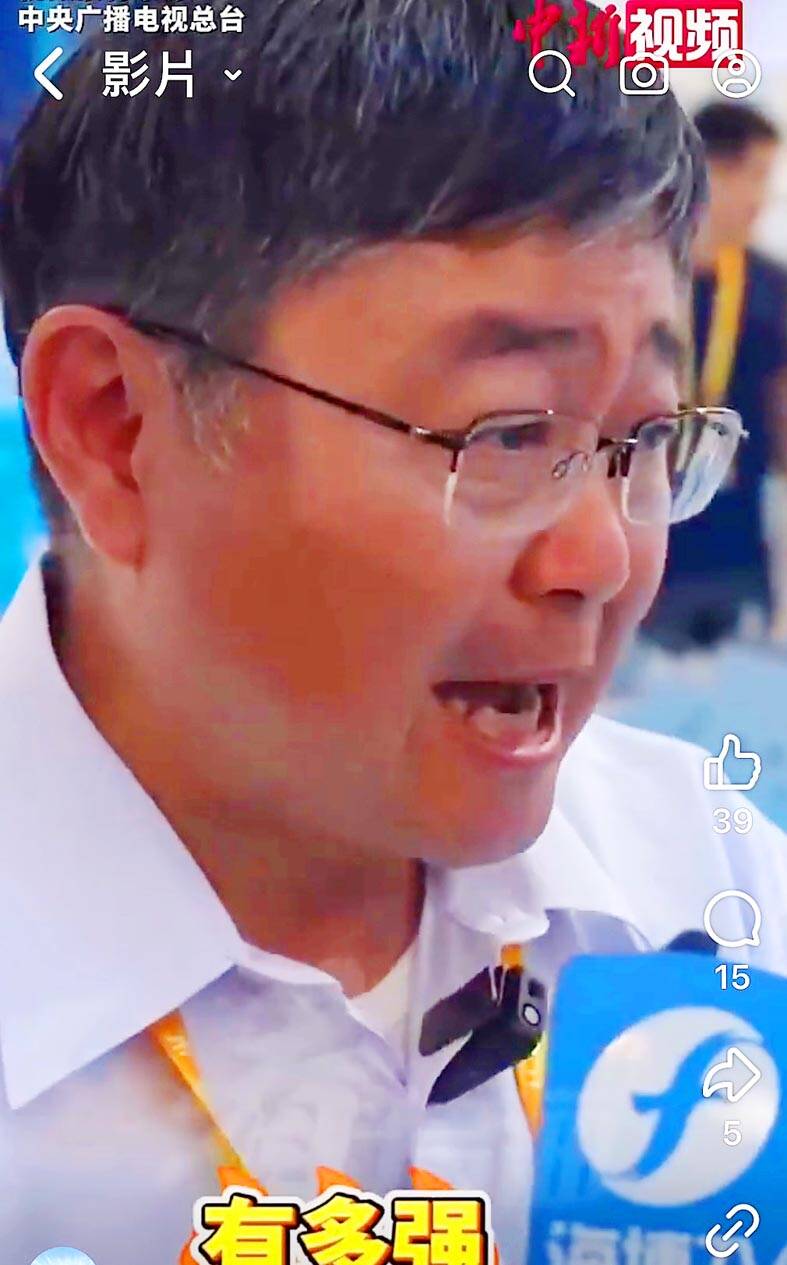The Ministry of National Defense yesterday said it has reminded retired officers to be careful with their words, after former navy lieutenant commander Lu Li-shih (呂禮詩) said he hoped to show Taiwanese “how strong China is” while attending China’s Zhuhai Airshow.
While Lu’s remarks might have been his personal opinion, retired military personnel should exercise judgement when making public statements and avoid damaging the nation’s dignity, the ministry said.
Lu cannot be punished under the Act Governing Relations Between the People of the Taiwan Area and the Mainland Area (臺灣地區與大陸地區人民關係條例), because he did not retire as a general, so his pension cannot be suspended nor his awards revoked.

Photo from China News Service’s video channel
The ministry said it has asked retired service members of all ranks to refrain from participating in activities hosted by Chinese authorities and that it has sought to strengthen patriotic education within its ranks.
Retired generals who act in ways harmful to Taiwan’s national dignity can face punishment, the ministry said, citing the case of retired general Tsang You-hsia (臧幼俠) last month. Tsang’s pension was reduced by 75 percent for the next five years after he was found guilty of standing at attention during the Chinese national anthem at a pro-unification event in Hong Kong.
The Chinese Communist Party often uses military displays of strength, and there has been increasing international concern about the threat that it poses, National Security Bureau Director-General Tsai Ming-yen (蔡明彥) said.
Vessels from nine countries have transited the Taiwan Strait to defend freedom of navigation, he said, adding that there has been growing international support for countermeasures against China.
Lu’s statement showed a misunderstanding of the geopolitical situation, Democratic Progressive Party China affairs department head Wu Jun-zhi (吳峻鋕) said.
China’s military strength is a significant threat to regional security and world peace, and Lu’s belief that it is beneficial or acts as a protection for Taiwan is a major misconception, Wu said.

A year-long renovation of Taipei’s Bangka Park (艋舺公園) began yesterday, as city workers fenced off the site and cleared out belongings left by homeless residents who had been living there. Despite protests from displaced residents, a city official defended the government’s relocation efforts, saying transitional housing has been offered. The renovation of the park in Taipei’s Wanhua District (萬華), near Longshan Temple (龍山寺), began at 9am yesterday, as about 20 homeless people packed their belongings and left after being asked to move by city personnel. Among them was a 90-year-old woman surnamed Wang (王), who last week said that she had no plans

China might accelerate its strategic actions toward Taiwan, the South China Sea and across the first island chain, after the US officially entered a military conflict with Iran, as Beijing would perceive Washington as incapable of fighting a two-front war, a military expert said yesterday. The US’ ongoing conflict with Iran is not merely an act of retaliation or a “delaying tactic,” but a strategic military campaign aimed at dismantling Tehran’s nuclear capabilities and reshaping the regional order in the Middle East, said National Defense University distinguished adjunct lecturer Holmes Liao (廖宏祥), former McDonnell Douglas Aerospace representative in Taiwan. If

TO BE APPEALED: The environment ministry said coal reduction goals had to be reached within two months, which was against the principle of legitimate expectation The Taipei High Administrative Court on Thursday ruled in favor of the Taichung Environmental Protection Bureau in its administrative litigation against the Ministry of Environment for the rescission of a NT$18 million fine (US$609,570) imposed by the bureau on the Taichung Power Plant in 2019 for alleged excess coal power generation. The bureau in November 2019 revised what it said was a “slip of the pen” in the text of the operating permit granted to the plant — which is run by Taiwan Power Co (Taipower) — in October 2017. The permit originally read: “reduce coal use by 40 percent from Jan.

‘SPEY’ REACTION: Beijing said its Eastern Theater Command ‘organized troops to monitor and guard the entire process’ of a Taiwan Strait transit China sent 74 warplanes toward Taiwan between late Thursday and early yesterday, 61 of which crossed the median line in the Taiwan Strait. It was not clear why so many planes were scrambled, said the Ministry of National Defense, which tabulated the flights. The aircraft were sent in two separate tranches, the ministry said. The Ministry of Foreign Affairs on Thursday “confirmed and welcomed” a transit by the British Royal Navy’s HMS Spey, a River-class offshore patrol vessel, through the Taiwan Strait a day earlier. The ship’s transit “once again [reaffirmed the Strait’s] status as international waters,” the foreign ministry said. “Such transits by